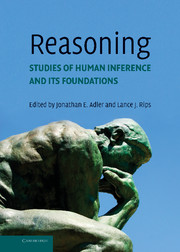Preface
Published online by Cambridge University Press: 05 June 2012
Summary
This is a collection of essays on reasoning – deductive, inductive, abductive, belief-revision, defeasible, cross-cultural, conversational, argumentative – oriented toward contemporary empirical research. The study of reasoning is, of course, a major focus of investigation in both philosophy and psychology, and this volume attempts to combine these perspectives. Philosophy, especially logic and philosophy of science, inspired psychology's interest in deduction, induction, and other forms of inference. In the past thirty years, the focus of common interest has greatly enlarged to include causal reasoning, cross-cultural comparisons, moral reasoning, and argumentation. There is increasing attention to reasoning as a response to new information or change of belief (belief-revision or defeasible reasoning), which is a far-reaching concern in epistemology. These advances, along with the more than twenty-year debate on rationality, have made reasoning a focal point of cognitive science research and reflections.
Three additional paths also are now converging on reasoning as major research interests. The first is a focus on fallacious reasoning and its reduction through education, which usually goes under the banner of informal logic or critical thinking. Second, the development of pragmatics, particularly following Grice's foundational contribution, has given rise to fruitful applications to traditional reasoning tasks. A number of commentators in the rationality debate have suggested connections between performance on those tasks and conversational expectations. These suggestions are coming in for experimental testing and some corroboration.
- Type
- Chapter
- Information
- ReasoningStudies of Human Inference and its Foundations, pp. ix - xPublisher: Cambridge University PressPrint publication year: 2008



